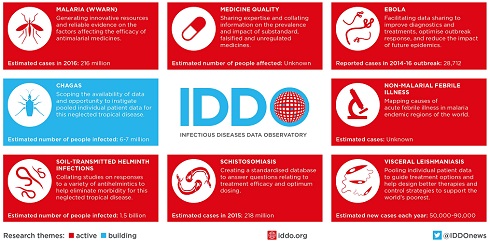Schistosomiasis and soil-transmitted helminthiases (STH) affect more than a billion of the world’s poorest people. Control of these neglected tropical diseases requires a better understanding of the efficacy of available treatments to improve intervention strategies. A new data platform is filling such knowledge gaps and welcomes further contributions from researchers.

As of 2017, infection data before and after treatment have been generated from 90 studies on schistosomiasis spanning 26 countries and 129 studies on STH across 39 countries. Until recently, most of these studies only made available summary statistics through publications, with results often reported in ways that weren’t standardized or statistically comparable across different trials. This made comparative analysis of efficacy between drugs, regimens and regions challenging.
A new scientific collaboration dedicated to schistosomiasis and STH between the Infectious Diseases Data Observatory (IDDO) and TDR (the Special Programme for Research and Training in Tropical Diseases) now pools and standardizes data from such studies. This allows the research community to better identify and address priority research questions, facilitate meta-analyses to generate evidence on the efficacy of existing medicines, inform the development of new ones and advance understanding of the diseases.
“The sharing and standardization of data from clinical trials is very valuable in making the analysis of schistosomiasis and STH treatment outcomes more meaningful and consistent,” said TDR Director John Reeder. “We welcome further contributions from researchers to expand this data platform and support the disease control effort.”
Launched in 2016, IDDO, which hosts the new data platform, is a scientifically independent, multidisciplinary coalition of the global infectious disease community. It provides the methods, governance and infrastructure to translate data into evidence that improves outcomes for patients worldwide. TDR, IDDO and the World Health Organization (WHO) convened two meetings in 2015 and 2018 to consult with stakeholders and experts to inform the development of the data-sharing platform.
Schistosomiasis is an acute and chronic disease caused by parasitic worms. People become infected when larval forms of the parasite, released by freshwater snails, penetrate the skin during contact with infested water. STH, also known as intestinal worms, are caused by intestinal parasites and are transmitted by fecal contamination of soil.
WHO encourages combined treatment for schistosomiasis and STH in areas where the two diseases occur concurrently. In 2017, more than 102 million people received praziquantel for schistosomiasis (with more than 90 million treated in WHO’s Africa Region alone), and 743 million people received preventive chemotherapy (albendazole or mebendazole) for STH.
Building on the success of sharing data on malaria
Sharing research data has become a key priority in most disciplines of science, with increasing support from international institutions, funders and journals. The new platform for schistosomiasis and STH builds on the success of the WorldWide Antimalarial Resistance Network (WWARN), a decade-long collaborative data-sharing framework that has proven it is possible to produce policy-changing scientific evidence from historical data . WWARN’s evidence has resulted in WHO revising the recommended drug dose for children treated with dihydroartemisinin-piperaquine. Its outputs also identified that malnourished children have a higher risk of treatment failure, and that fixed-dose combination of artesunate-amodiaquine are more effective than non-fixed dose.
“We want the platform to be a hub that facilitates collaboration and data sharing among researchers and stakeholders in the schistosomiasis and STH communities,” said Martin Walker, Assistant Professor in Epidemiology at the Royal Veterinary College, London Centre for Neglected Tropical Disease Research and IDDO Scientific Lead on the platform. “We are sure that we can emulate the successes of WWARN in the neglected tropical diseases domain.”
"Availability of comparable data can potentially improve planning and optimize efforts for the control of morbidity due to these two parasitic infections as we continue to scale-up treatment globally," said Dr Antonio Montresor in charge of WHO’s global programme for intestinal worms.
Ensuring patient privacy and managing data quality and access
Maintaining participant privacy and confidentiality is a key priority. IDDO has integrated robust technical and statistical solutions to ensure the security and anonymity of data. Only anonymized data are shared to the data platform and these are verified to ensure compliance with the HIPAA Safe Harbor process.
Researchers from whom the data originate will be involved on a voluntary basis in collaborative individual patient data meta-analyses to promote accurate interpretation of the data and high-quality research. External access to data are managed by a Data Access Committee (DAC) chaired by TDR and a group of public health independent representatives. This gatekeeper mechanism will ensure that data are shared only with qualified researchers, to address a knowledge gap of public health significance, within the agreed terms of consent and data collection.
At the request of the health communities working on specific infectious diseases, like the schistosomiasis/STH community in 2015, IDDO is adapting its proven model in malaria and developing processes for other poverty-related infectious diseases and topics, including non-malarial febrile illness, Ebola, visceral leishmaniasis, and medicine quality.
For more information, please contact Robert Terry.

